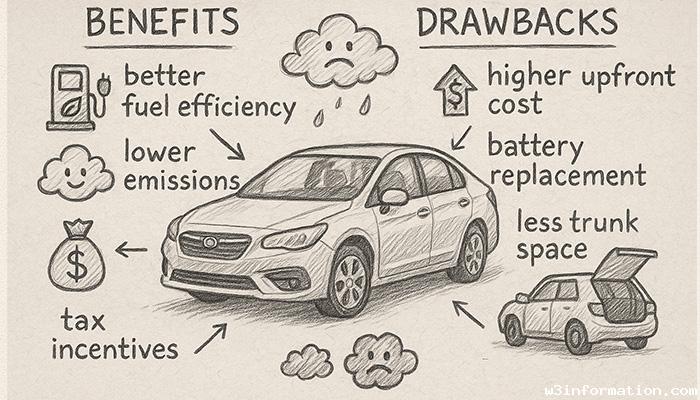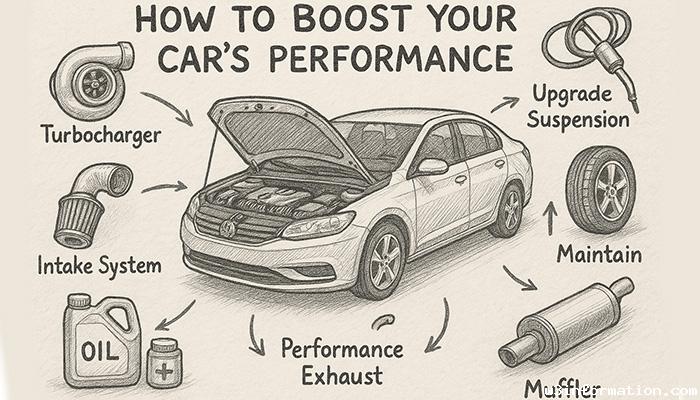The Pros and Cons of Owning a Hybrid Vehicle
Hybrid vehicles now serve as a practical compromise between gas-powered vehicles and fully electric cars because they offer both fuel efficiency and reduced emissions while society progresses toward sustainable living. Hybrid cars merge an internal combustion engine with an electric motor to deliver better fuel economy and lower emissions. Owning a hybrid vehicle brings both benefits and disadvantages because it represents a major investment just like any other. This section examines both positive and negative aspects to assist you in determining whether a hybrid vehicle fits your needs.
Pros of Owning a Hybrid Vehicle
Better Fuel Efficiency:
The combination of an electric motor managing low-speed operations makes hybrid cars achieve exceptional fuel efficiency during city driving. The excellent fuel efficiency of hybrid cars results in reduced visits to the gas station which leads to greater savings over time.

Environmentally Friendly:
Hybrid cars produce less carbon dioxide and fewer pollutants than traditional vehicles which makes them the preferred option for environmentally aware drivers.Hybrid cars minimize carbon emissions through strategic use of electric power during specific driving conditions.
Regenerative Braking
Regenerative braking systems in most hybrid vehicles capture energy lost during braking to recharge the battery. The battery life gets extended when overall energy efficiency improves.
Tax Incentives and Rebates:
Several governments provide financial incentives for buying green vehicles through tax credits, rebates and toll or congestion fee exemptions. These advantages can help reduce the initial expense of buying a hybrid vehicle.
Quiet and Smooth Ride
The electric motor in hybrid vehicles delivers a quieter and smoother driving experience at low speeds. The shift from electric to gas power operates smoothly to improve the driving experience.
Cons of Owning a Hybrid Vehicle:
Higher Initial Cost:
The advanced technology and dual powertrain systems in hybrids make their purchase price higher than traditional gasoline-only vehicles. Fuel savings might eventually balance out this cost but the initial purchase price remains an obstacle for certain buyers.
Expensive Repairs and Maintenance:
Hybrid cars need less maintenance but their repair costs rise significantly when battery replacements become necessary. Access to specialized mechanics and parts remains difficult in certain locations.
Limited Electric Range
Hybrids cannot maintain long-distance driving with only electric power unlike fully electric vehicles. Hybrid vehicles use gasoline to cover longer distances or achieve faster speeds which might not suit people who desire completely emissions-free travel.
Smaller Trunk Space
The combination of an engine and a battery in hybrid vehicles leads to reduced cargo space in some models. The practicality of certain models can be diminished for families or people who need significant storage space.
Performance Trade-Offs
Hybrid vehicles provide efficient performance but typically fall short of gas-powered and electric cars when it comes to speed, power output, and towing capabilities. Drivers who prioritize sporty acceleration and handling can find hybrid vehicles underwhelming in their performance.
Conclusion
Drivers who live in cities or focus on saving fuel should consider hybrid vehicles because they provide environmental benefits and smart economic advantages. Prospective hybrid owners must assess whether the initial higher purchase price and any maintenance issues outweigh the advantages offered by hybrid cars. Your driving patterns together with financial plans and ecological commitments can guide you toward an informed vehicle choice. Hybrid vehicles offer an optimal solution for drivers who want both good performance and environmental been.
 How to Create an Effective Learning Environment at Home
How to Create an Effective Learning Environment at Home
 Top 10 Study Tips for Students
Top 10 Study Tips for Students
 How Online Learning is Changing the Education Landscape
How Online Learning is Changing the Education Landscape
 How to create backend CRM using React JS
How to create backend CRM using React JS
 How to Boost Your Car’s Performance
How to Boost Your Car’s Performance
 The Best Road Trips for Car Lovers
The Best Road Trips for Car Lovers